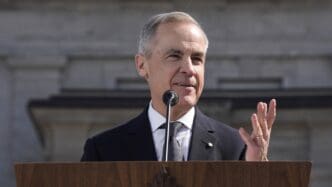Kananaskis, Alberta – At the recent G7 summit held in the scenic Canadian Rockies, global leaders grappled with escalating geopolitical tensions, focusing primarily on the ongoing Russia-Ukraine war and the volatile situation in the Middle East. The summit underscored the pressing need for concerted international actions in response to these crises.
Prominent among the agenda was the protracted conflict between Russia and Ukraine. European Commission President Ursula von der Leyen emphasized the necessity for increased sanctions against Russia to persuade President Vladimir Putin to engage in genuine negotiations for peace. "More sanctions on Russia are critical to halting the war and bringing President Putin to the negotiating table," she affirmed.
However, the summit revealed divisions among members regarding a unified approach to the Ukraine situation. Ukrainian President Volodymyr Zelensky departed from the meeting expressing disappointment over the lack of a collective declaration of support from the G7 members and noted the absence of a meeting with U.S. President Donald Trump. Despite these setbacks, Canada pledged fresh military aid worth C$2 billion to Ukraine, alongside new financial sanctions.
In a statement that showed support for President Trump's peace efforts in Ukraine, the G7 reiterated its call for an unconditional ceasefire from Ukraine and urged Russia to reciprocate. However, Canada's independent issuance of this statement highlighted internal discord within the G7 about the overall strategic response.
Beyond Europe, the Middle East's precarious stability was another focal point. President Trump, prioritizing this issue, left the summit prematurely to address the escalating tensions between Israel and Iran. The G7 leaders collectively called for calm, affirming Israel's right to self-defense while labeling Iran as a principal source of regional instability. "We have been consistently clear that Iran can never have a nuclear weapon," the G7 statement read, highlighting the urgency of de-escalating hostilities in the region.
Amidst these diplomatic challenges, Iran launched multiple missile strikes against Israel, intensifying the conflict. The strikes followed Israel's aggressive military actions deep within Iranian territory, which reportedly decimated a significant portion of Iran's military leadership. The International Atomic Energy Agency confirmed substantial damage to Iran’s Natanz nuclear facility, further complicating diplomatic efforts.
Iranian Foreign Minister Abbas Araqchi, responding to the situation, demanded a halt to Israeli military actions, warning of continued hostilities otherwise. Meanwhile, significant civilian evacuations took place in both nations, with heavy traffic reported as Iranians fled urban centers.
The G7 summit, attended by leaders from Britain, Canada, France, Germany, Italy, Japan, and the United States, was the first since President Trump's re-election. It highlighted the intricate balance of addressing both European and Middle Eastern issues, with an overarching call for increased diplomatic efforts and international cooperation to stabilize global peace and market conditions.








